Ground beetles are essential allies in natural pest control and maintaining healthy soils. They hunt pests like aphids, caterpillars, and slugs, helping you reduce chemical use while supporting ecosystem balance. By creating suitable habitats—such as leaving leaf litter or using organic mulches—you can attract these beneficial predators to your garden or farm. Keep exploring, and you’ll discover simple ways to encourage these helpful beetles and enhance your pest management approach.
Key Takeaways
- Ground beetles are natural predators that control soil-dwelling pests like aphids, caterpillars, slugs, and beetles.
- They support ecosystem health by maintaining predator-prey balance and reducing the need for chemical pesticides.
- Creating habitats with leaf litter, mulch, and minimal soil disturbance encourages ground beetle populations.
- Avoiding broad-spectrum pesticides helps protect these beneficial insects and enhances natural pest control.
- Promoting ground beetle diversity benefits sustainable agriculture by lowering chemical use and supporting soil health.
The Role of Ground Beetles in Ecosystem Balance
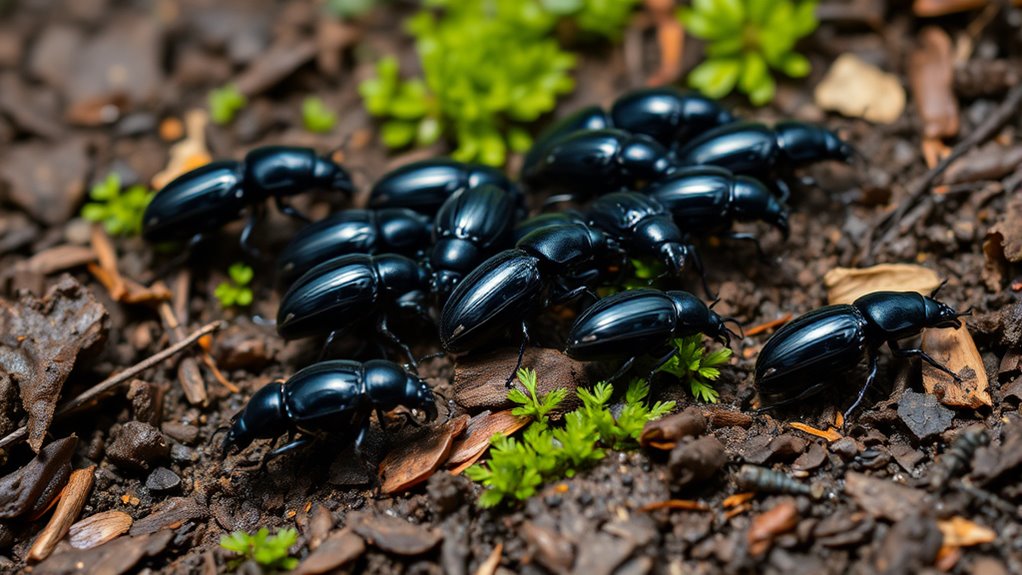
Ground beetles play a crucial role in maintaining ecosystem balance by controlling populations of pests and other insects. Their diversity, known as ground beetle diversity, is essential for a healthy environment because different species target specific pests, preventing any one population from becoming overwhelming. By keeping pest numbers in check, ground beetles contribute markedly to soil health enhancement, as they reduce the need for chemical pesticides that can harm soil quality. Their presence indicates a balanced ecosystem where natural predator-prey relationships thrive. You’ll find that areas rich in ground beetle diversity tend to have healthier soils, with improved nutrient cycling and reduced pest-related damage. Overall, these beetles serve as natural guardians, supporting the stability and productivity of terrestrial ecosystems.
How Ground Beetles Help Manage Garden Pests
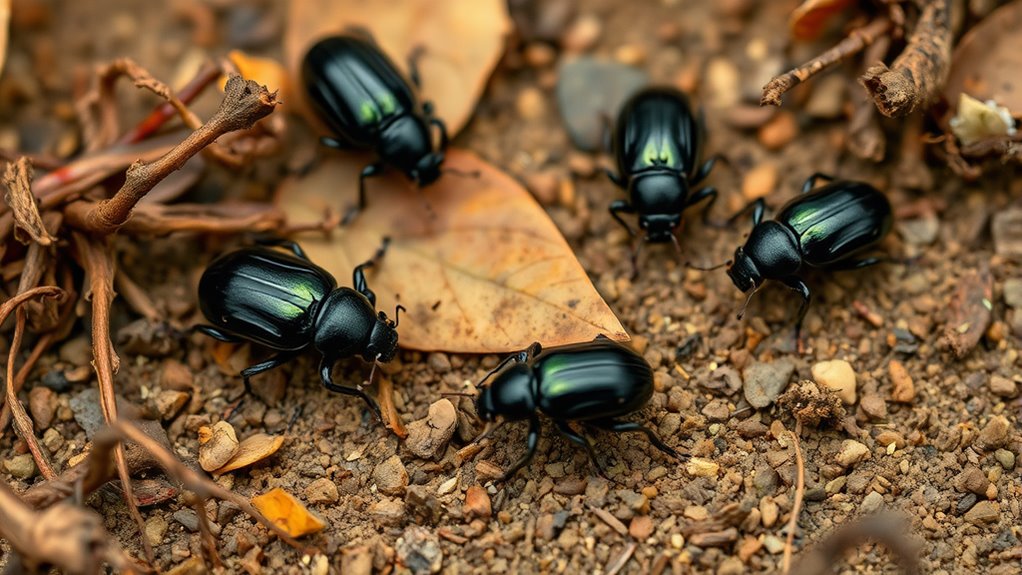
By encouraging a diverse population of ground beetles in your garden, you can naturally reduce pest problems without relying heavily on chemical controls. Ground beetle habitats, such as leaf litter, soil cracks, and mulch, provide ideal environments for these beneficial insects to thrive. They actively hunt pests like aphids, caterpillars, beetles, and slugs, using effective pest predation strategies. Ground beetles are nocturnal predators that patrol the soil surface and beneath debris, swiftly capturing and consuming pests. Their presence helps keep pest populations in check, reducing the need for chemical interventions. Maintaining suitable habitats and avoiding pesticides that harm ground beetles supports their pest predation strategies and promotes a healthier, more balanced garden ecosystem.
Attracting and Supporting Ground Beetle Populations
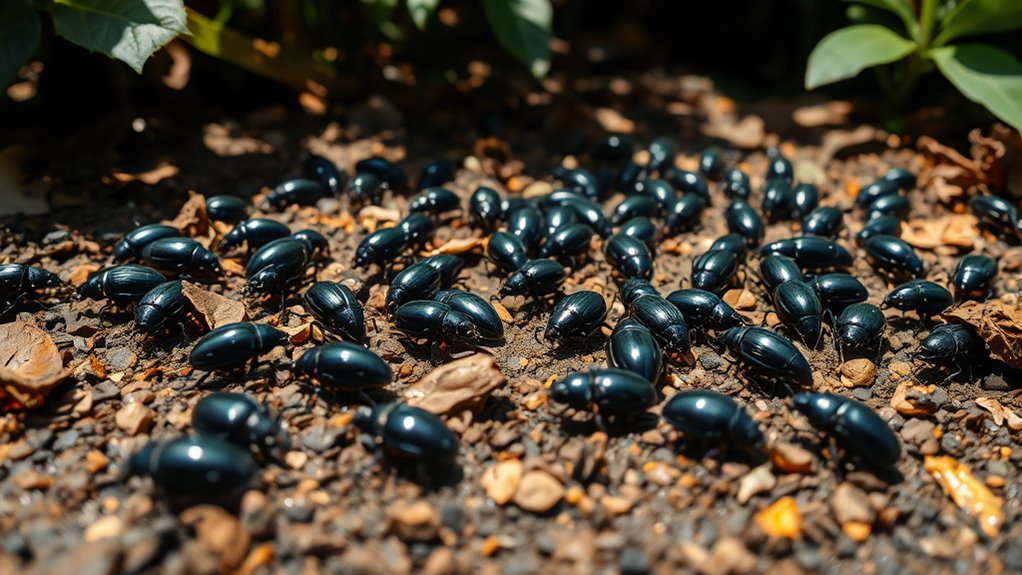
To attract and support ground beetle populations in your garden, focus on creating a welcoming environment that provides shelter, food, and habitat diversity. Habitat modification, such as leaving leaf litter, mulch, and fallen logs, offers essential shelter and breeding sites. Reducing soil disturbance encourages beetles to thrive. Avoid using pesticides, especially broad-spectrum ones, as they harm beneficial insects and disrupt their populations. Instead, adopt pesticide avoidance strategies to maintain a healthy, balanced ecosystem. Plant native vegetation and maintain ground cover to supply natural prey and habitat variety. By making these adjustments, you foster a stable environment that naturally attracts ground beetles, helping you harness their pest control benefits and support a sustainable, healthy garden. Leverage biological control by encouraging beneficial insects like ground beetles to naturally manage pest populations.
Benefits of Natural Pest Control for Sustainable Agriculture
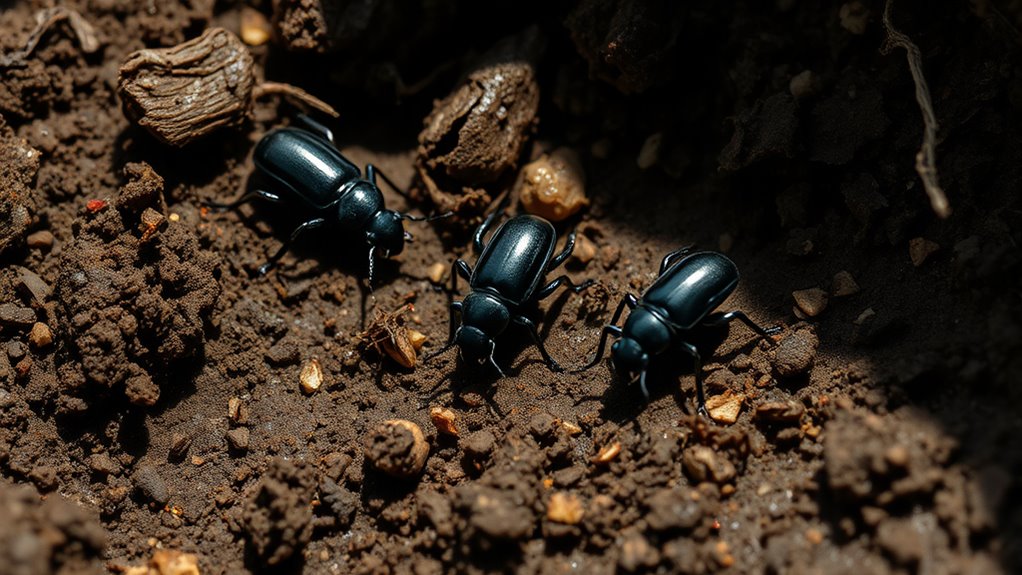
Implementing natural pest control methods offers significant benefits for sustainable agriculture by reducing reliance on chemical pesticides. When you rely less on chemicals, you lower pesticide risks that can harm beneficial insects, soil health, and water quality. Ground beetles play a key role here, naturally controlling pests without the need for harmful chemicals. Additionally, fostering positive vibrational energy can enhance the effectiveness of natural pest control techniques, aligning with the Law of Attraction principles.
Practical Tips for Encouraging Ground Beetles in Your Space
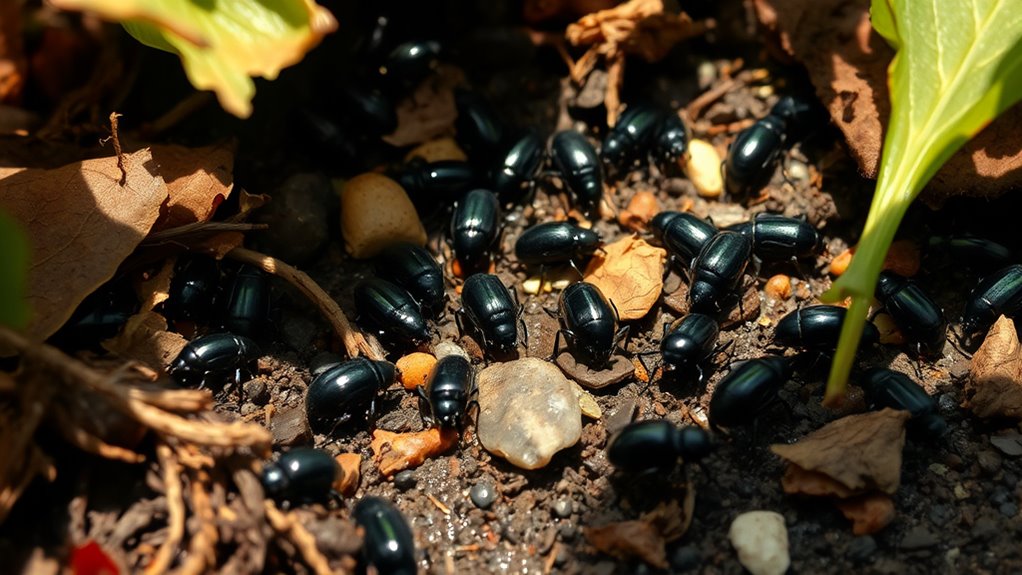
Creating an inviting environment is the first step to encouraging ground beetles in your space. Start by planting native species that support local ecosystems, as these plants attract natural prey and provide shelter. Maintaining proper soil moisture is also essential; ground beetles thrive in moist soils, so avoid overly dry or waterlogged conditions. Mulching with organic materials helps retain soil moisture and creates hiding spots, making your garden more appealing. Reduce chemical use, especially pesticides, which can harm ground beetle populations. Incorporate cover crops or ground covers to offer additional shelter and food sources. Regularly check your soil health and avoid disturbance during beetles’ active periods. Additionally, choosing high contrast ratios in soil and habitat design can help create visual cues that support beetle activity and navigation. By creating a balanced, natural environment with native planting and appropriate soil moisture, you encourage ground beetles to flourish naturally.
Frequently Asked Questions
Are Ground Beetles Safe for Children and Pets?
You might wonder if ground beetle safety is a concern around children and pets. The good news is, ground beetles are generally safe and pose no harm to kids or pets. They’re a natural, pet-friendly pest control option, helping manage soil pests without chemical risks. You can confidently use ground beetles as part of your pest control strategy, knowing they’re safe and eco-friendly for your family and furry friends.
How Long Do Ground Beetles Typically Live?
Think of ground beetles as tiny warriors with varying battle lengths. Their lifespan, like a hero’s journey, varies with environmental factors such as habitat, food availability, and climate. Typically, these resilient creatures live from one to three years, but some may extend their story with ideal conditions. Your local environment influences their longevity, so understanding these variations helps appreciate how these natural pest controllers continue their important work underground.
Can Ground Beetles Control All Types of Soil Pests?
You might wonder if ground beetles can control all soil pests, but their effectiveness varies with soil pest diversity. They use beetle predation tactics like hunting at night and ambushing prey, which work well against many pests, but not all. Some pests have defenses or live in areas beetles can’t reach. So, while they’re valuable allies, relying solely on ground beetles might not eliminate every soil pest problem.
Do Ground Beetles Prefer Organic or Conventional Gardens?
Ever wondered if ground beetles favor organic or conventional gardens? Your gardening preferences influence their presence; they thrive where pest management strategies support natural methods. If you focus on organic practices, you’ll likely attract more ground beetles, since they prefer environments free of synthetic chemicals. So, by choosing organic gardening, you’re promoting a healthier ecosystem where these beneficial insects can flourish and naturally control soil pests.
What Signs Indicate a Healthy Ground Beetle Population?
You can tell your ground beetle population is healthy when you notice high predator abundance and vibrant soil biodiversity. Signs include fewer pest insects, active beetles scurrying in the soil, and diverse plant growth. A thriving ground beetle community indicates a balanced ecosystem, helping naturally control pests. Keep your soil healthy and undisturbed to support their presence, ensuring ongoing pest suppression and soil robustness.
Conclusion
By encouraging ground beetles in your garden, you’re supporting natural pest control and promoting a healthier ecosystem. Did you know that a single ground beetle can consume up to 5,000 pest insects in its lifetime? That’s a powerful ally for sustainable gardening. So, create inviting habitats and let these unsung heroes do their job—reducing chemicals and boosting your garden’s resilience naturally. Embrace ground beetles and enjoy a thriving, pest-free space!









